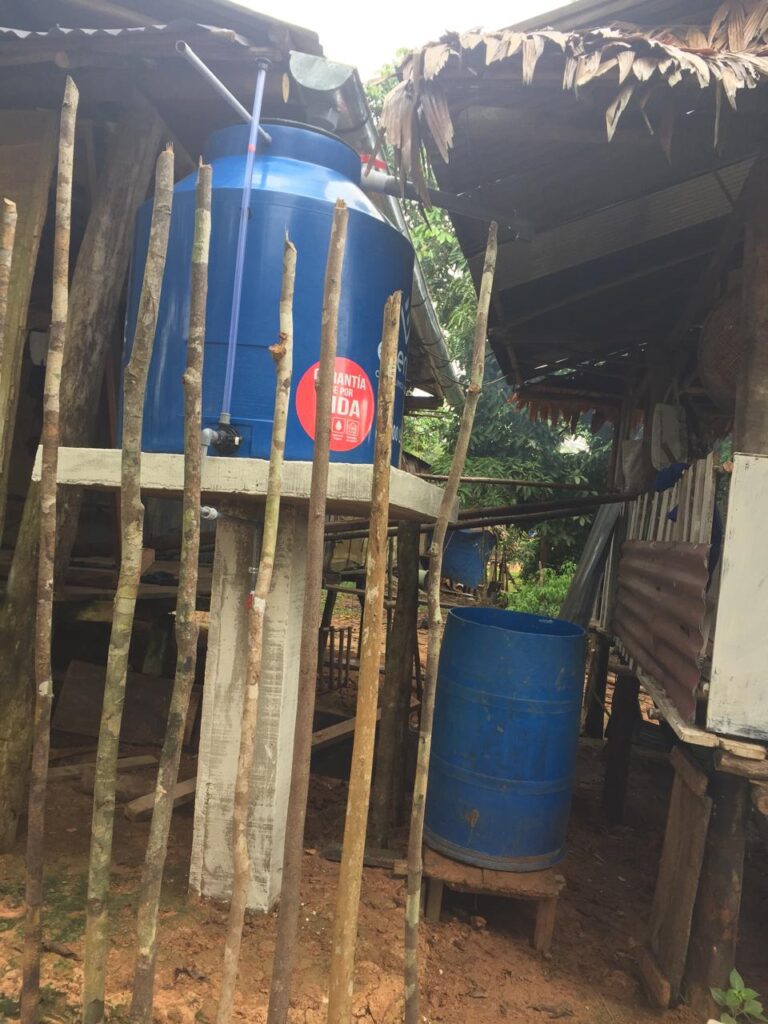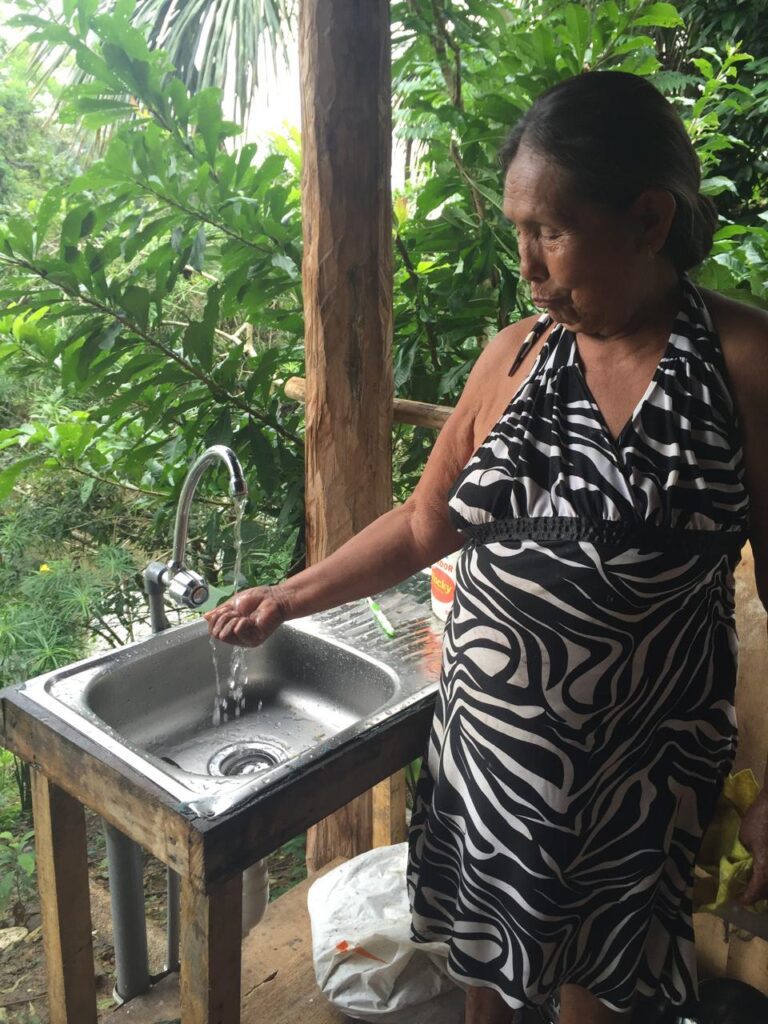Water for all: NGO INFANT helps the Yagua community in Iquitos to implement an innovative system that transforms rain into drinking water
Thanks to this project, families in this part of Peru have stopped consuming water contaminated with toxic waste and have been trained to implement this technique
Loreto is the region of Peru with the highest deficit in access to clean water, with only 56% of the population connected to a public network, according to the Ombudsman. Most families are forced to rely on nearby rivers and streams to meet their basic needs for washing, hygiene, and consumption. However, these water sources are contaminated with toxic elements, waste, and feces, which poses a severe risk to the health of children and the elderly in the population.
By mid-last year, 10 deaths had been recorded due to a diarrheal outbreak in several native communities in Loreto, 9 of which were Indigenous children. The severe health crisis faced by this region of the country led the ONG INFANT – Instituto de Formación para Adolescentes y Niños Trabajadores (“NGO INFANT – Institute for Training Adolescents and Working Children”, in English) to establish itself in the district of Belén to provide direct assistance.
The NGO focused on the Yagua native community, which consists of 22 families living along the banks of the Momón River in the Punchana district. The Yagua are one of the groups with significant participation in Loreto’s tourism circuits, living on the border with Brazil and Colombia.

Members of INFANT noticed that the consumption of contaminated water causes respiratory diseases, diarrhea, malnutrition, cholera, and dermatitis, among other issues, in the most vulnerable individuals. In response, their first action was to create a rainwater harvesting system, allowing clean water to reach homes directly.
To make the system that would provide them with clean water a reality, all the families participated in courses on “metalworking and formwork” to learn how to make footings, columns, and platforms. Meanwhile, the NGO took care of providing water tanks for each house. “Participation was massive. Everyone learned: men, women, and the involvement of children was essential, as some parents cannot read, so the younger ones were responsible for writing down the processes to be followed. Everyone supported”, explains Esther Díaz, director of INFANT.


Pedro Paredes, an agronomist and partner at INFANT, explains that much of the roofing in rural areas is made of corrugated metal, which has a channel where rainwater accumulates. “The channels act as collectors, where the water stays and we direct it to the top of the tank. That’s why training is important; they need to know the height at which the platforms holding the tank should be, so that the roof’s channel drains into the tank’s opening”.
To ensure water quality, they were instructed in the purification process using sodium hypochlorite. The water collected through this system was analyzed in the biology laboratories of the National University of the Amazon (“Universidade Nacional da Amazônia Peruana”), ensuring that it met the necessary drinking water standards for community health. “The water is safe for consumption; it is free from pathogenic bacteria”, states Pedro.
This initiative marked a significant change in the residents’ lives. “Before, women and children had to carry large containers of water on their heads and climb steep slopes. It was a huge sacrifice”, adds Díaz.
Ecotechnologies for better waste management and fertilizer production
Along the banks of the Itaya River, the situation is alarming. The floating toilets installed in the region allow human waste to flow directly into the river, critically increasing its contamination. According to microbiological analyses, contamination levels are 900 times above what is permitted by the World Health Organization (WHO), which continues to pose a serious risk to community health.
In an effort to reverse this reality, the NGO INFANT has implemented another innovative ecotechnology project aimed at changing the waste management paradigm in the communities of ‘San Andrés’ and ‘8 de Diciembre’. This system of ecological toilets, designed to eliminate environmental contamination, transforms excrement into fertilizer, promoting a sustainable practice.
“Waste is deposited in wooden boxes, then sawdust is added, and it is taken to a closed room that we call the ‘fecal waste drying module.’ In this enclosed environment, heat is generated, like in an oven, and this heat kills pathogenic germs. We confirmed this through a master’s thesis by a student from the United States who conducted research concluding that germs die within 3 to 6 months”, details Pedro.
Subsequently, this material is mixed with forest waste or dry leaves, moistened, and left for several more months until decomposition occurs. “The samples we obtained to assess nutrient levels were encouraging. We used it in cultivation, and the results are surprising; it is a very important material for farmers”, adds Pedro. These toilets do not cause contamination and, for now, operate only in educational spaces, where daily training activities for children are conducted.
Despite the efforts, local authorities have shown resistance to investing in these solutions that could significantly improve living conditions in the region. The lack of response from authorities hinders the expansion of these initiatives, which could benefit more communities affected by the health crisis, especially in areas where rivers are practically used as dump sites.
The situation in Loreto is critical, particularly in peripheral areas, where health indicators are concerning. According to the 2024 evaluation by the Private Council for Competitiveness (CPC), Loreto has the worst public management and ranks last in various well-being indicators, reflecting the urgency of implementing effective and sustainable actions.
Meanwhile, the Itaya River continues to be a reflection of the struggle between contamination and innovation. In this context, the water collection system, combined with the implementation of ecological toilets, presents a viable solution that could not only transform the sanitary landscape but also offer a new perspective on environmental care in Loreto.
Do you like the work that ‘INFANT’ does and want to help?
Currently, families in the Yagua community have 600-liter tanks, but ideally, they should have 1100-liter tanks, as sometimes it doesn’t rain, and that’s when families need to conserve water even more. In addition to tanks, INFANT is welcoming volunteers who want to be part of their aid projects and donations, which can be financial or specific items, such as:
- Sawdust
- Wood
- Bricks
- Water tanks
- Roof tiles
- Pipes
- Toilet lids
You can also learn more about them through their social media: Website | Facebook | Instagram


